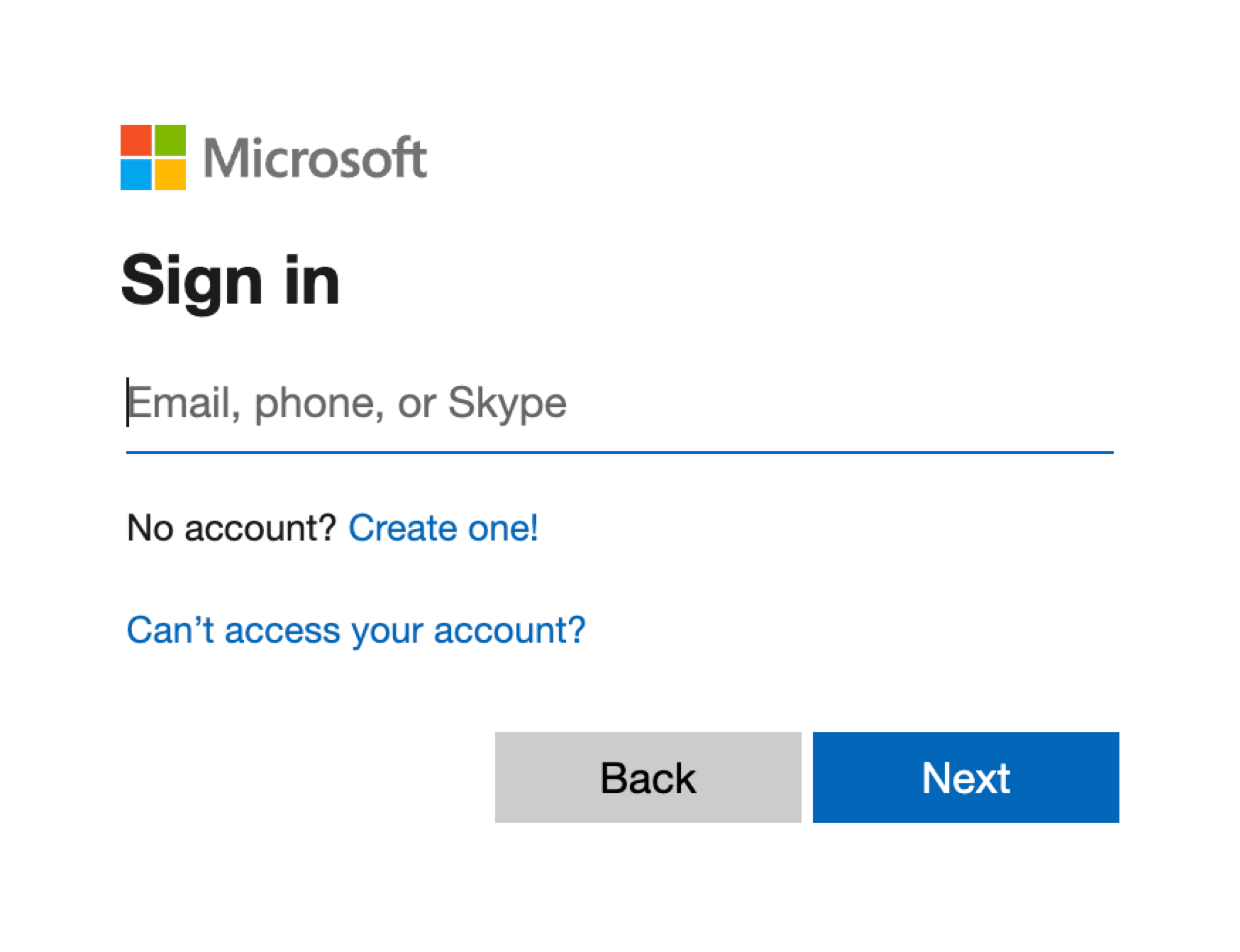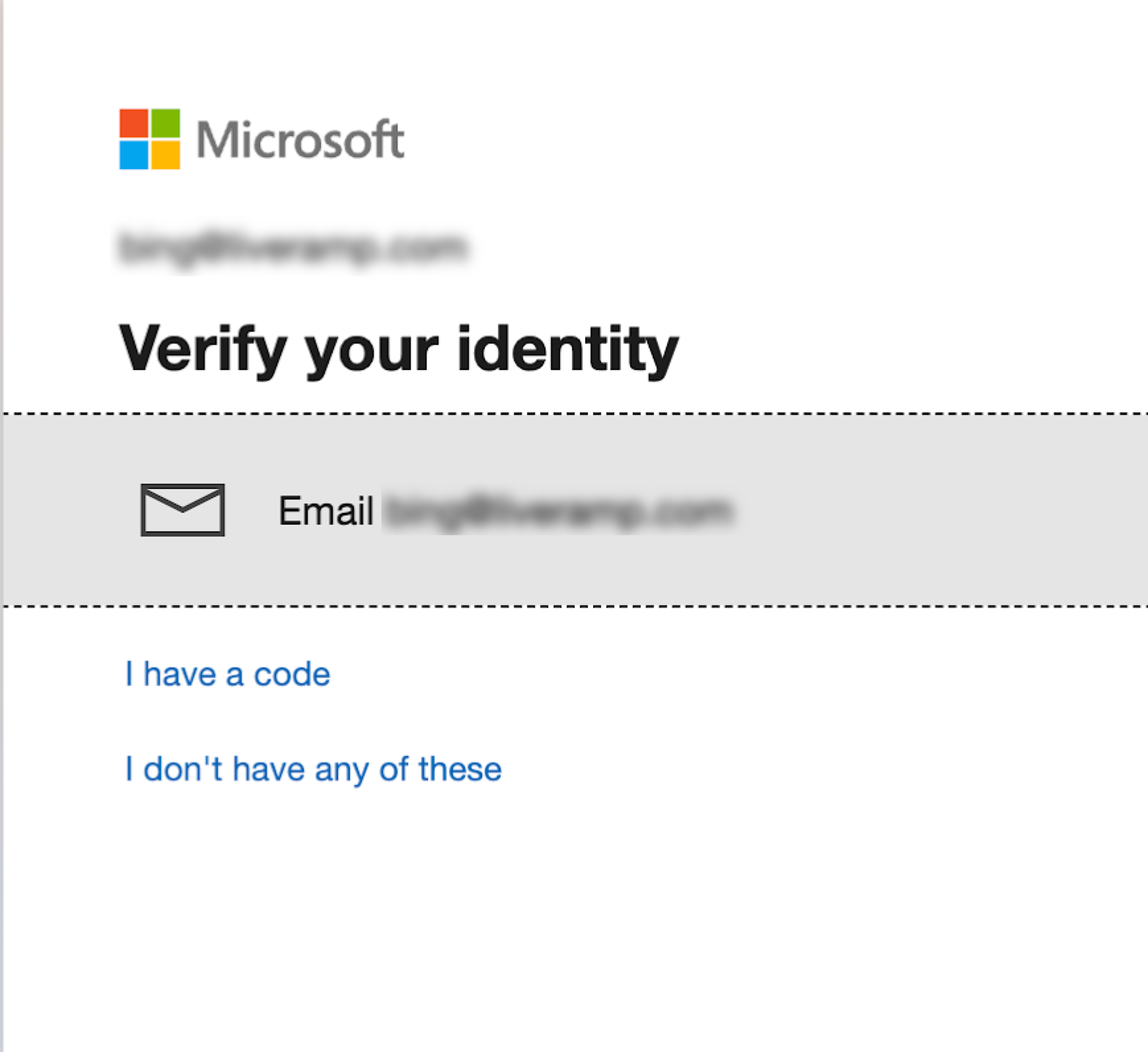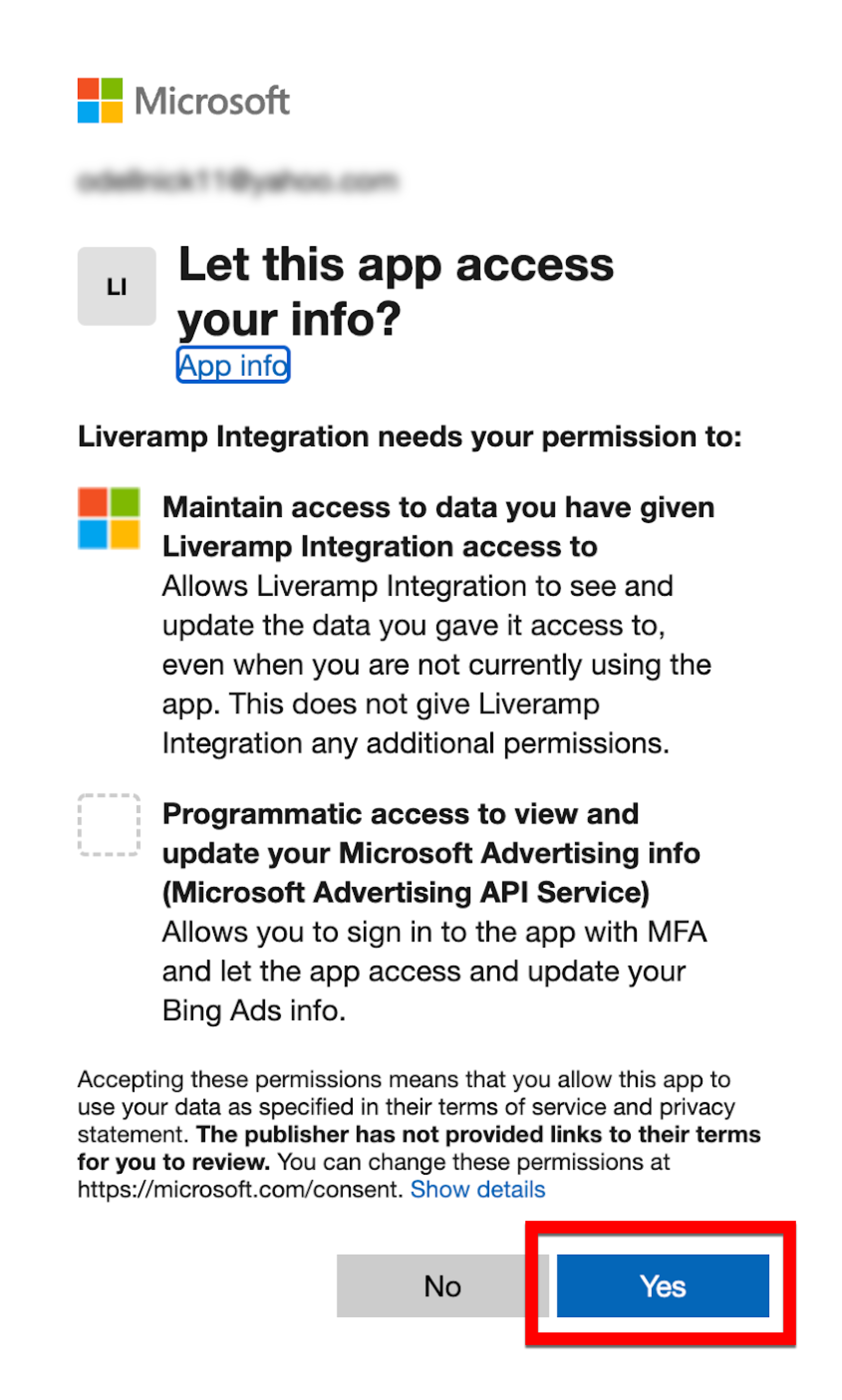Distribute Data to Bing
See the sections below for information on distributing first-party data to Microsoft Bing (Bing).
Bing requires that an authorization using OAuth be performed by a user with the appropriate permission level before any distributions can be made to Bing. For more information, see the "Performing OAuth Authorization for Bing" section below.
Note
Distributing data with Connect involves activating a destination account for the destination you’re distributing to and then adding segments to distribution for that destination account. See the articles below for instructions:
Overview of the Bing Integration
LiveRamp's integration with Bing follows the guidelines listed in the table below:
Caution
The information listed below was current at the time of publication and represents our best understanding of the integration based on the information available at the time, including information given to us by the destination platform. Any sections not filled out are areas we did not have information on at the time of publication. Use this as a general guide, but check with the platform to confirm any areas that are critical to your use case.
Category | Area | Info | Notes |
|---|---|---|---|
Delivery/Matching | Identifiers that can be delivered |
| |
Lookback window | |||
Time to live | |||
Enabled for Record Sync | Yes | For more information, see "Keep Destination Data Fresh with Record Sync". | |
Accepts raw fields | Yes | ||
Duplicate segment names allowed | Yes | ||
Configuration | Account info needed |
| |
Requires OAuth authorization | Yes | ||
Additional data restrictions | No | ||
Requires LiveRamp action to activate destination account | No | ||
Data Marketplace | Accepts Data Marketplace data | No | |
Data Marketplace pricing used | |||
Additional Data Marketplace limitations or guidelines | |||
Additional Information | Can display matched reach in Connect | Yes | |
Limit on number of audiences per seat ID in the platform | |||
Exposure logs available | |||
LiveRamp Conversions API program available | Yes |
Bing Integration Options
When activating a Bing destination account, the following integration option is available:
Use | Data Type | Who It's For | Integration Name |
|---|---|---|---|
Distributing first-party data to Bing and utilizing Record Sync. | Advertisers | Bing First-Party Data |
Distribute First-Party Data To Bing
To distribute first-party data to Bing, activate the “Bing First-Party Data” destination account tile by following the instructions in "Activate a New Destination Account".
Once you’ve activated the destination account, follow our instructions on distributing data to a destination.
Configure the Required Properties
When activating the destination account, the following fields are required:
Field | Description | Notes |
|---|---|---|
Customer ID | Customer ID issued to you by Bing. | This is a numeric ID. |
MSA Email | Enter your Microsoft Account Email. | This is typically the email used to log into Microsoft Ads. |
Destination Account Name | The name you want to give to this destination account. | Enter a unique and memorable name for this destination account, or accept the default suggested name. You can use any name you want as long as it is less than 150 characters in length. |
Enable and Validate an OAuth Connection
Follow the instructions in “Validate OAuth Connection During Destination Account Activation” and "Perform OAuth Authorization for Bing" below to enable and validate an OAuth connection for the Bing destination account.
Performing OAuth Authorization for Bing
Bing requires that an authorization using OAuth be performed by a user with the appropriate permission level before any distributions can be made to Bing.
Within Connect, OAuth authorizations are performed by utilizing an OAuth "connection" and validating it with your destination-specific information. A connection can be created by any user with the appropriate permission level at Bing and can be reused for multiple Bing destination accounts. See "Managing OAuth Connections" for information on creating, viewing, and managing OAuth connections.
This validation must be done when the destination account is activated, either by using an existing Bing OAuth connection or by creating a new Bing connection during the activation process. You can also create a Bing OAuth connection outside of the destination account activation process. See "Activate a Destination Account for OAuth Destinations" for more information.
Whichever method you use, follow the instructions in "Perform OAuth Authorization for Bing" below once the Pinterest authorization dialog appears.
Perform OAuth Authorization for Bing
Permission level required: Super Admin or Standard User
Prerequisites: Bing requires that your Microsoft ads accounts be configured to allow users to consent to apps before OAuth authorization can be completed. To enable this setting, a user with either a Global Administrator or Privileged Administrator role will need to follow these instructions and select the "Allow user consent for apps" option (the third selection in the image below). If you have any issues, contact your Bing representative.

Note
LiveRamp is not able to provide workarounds for these settings. Contact Microsoft to troubleshoot the Azure Admin requirements.
Required Account Type: Contact your LiveRamp account representative for Required Account Type information.
OAuth expiration: None
Required destination account fields: Customer ID
Once the Microsoft login dialog appears, enter your credentials and then click .

Complete the Multi-Factor Authentication process.

From the Authorize app dialog, review the access granted and click .

You’ll be directed back to the destination account screen and should see the blue success banner at the top of the screen.
Troubleshooting Bing OAuth Issues
If you're having issues with your Bing OAuth connection, try these troubleshooting steps:
Confirm that you have “Super Admin” or “Standard User” permission levels on your account.
Confirm that the Microsoft Ads account is configured to allow users to consent to apps. To enable this setting, a user with either “Global Administrator” or “Privileged Administrator” will need to follow these instructions and select the "Allow user consent for apps" option (the third selection). For further assistance, reach out to your Bing rep.
Once confirmed, create a new OAuth connection and use that connection to validate the destination account.
Note
If multiple unused Bing OAuth connections exist, remove them, create a new connection, and use that connection to validate the destination.
If the above steps do not resolve the issue, create a support case.